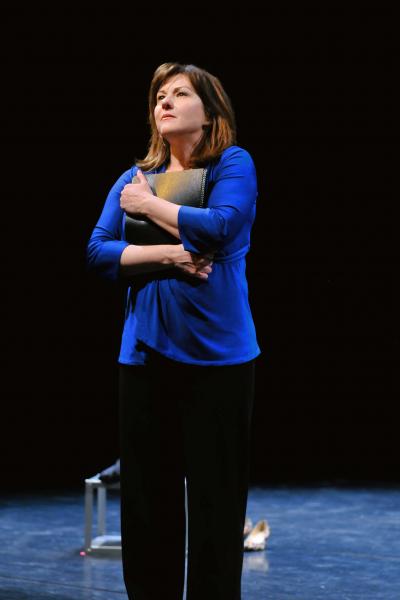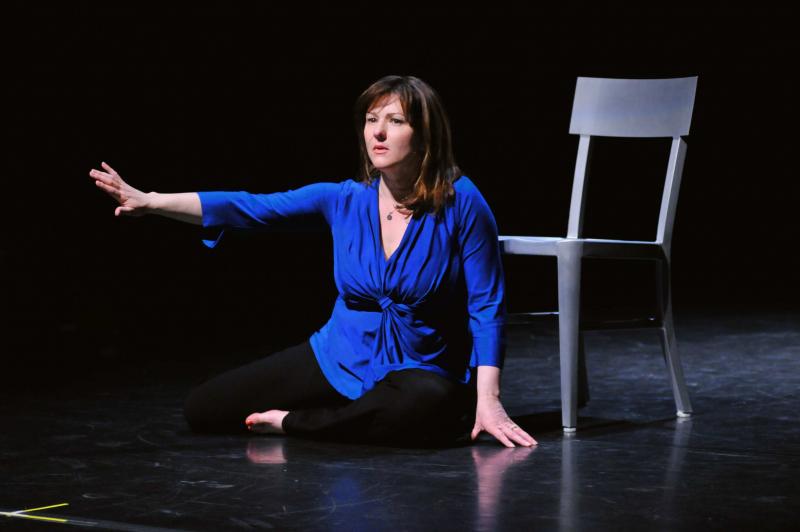Why Girls Shouldn't See 'Truth Values'

With that comment from a jerky colleague, Gioia De Cari begins her hilarious tale of woe about her years studying mathematics at the Massachusetts Institute of Technology. Her one-woman show, “Truth Values: One Girl’s Romp Through MIT’s Male Math Maze,” which she performed Wednesday as part of USC’s Visions and Voices initiative, is a poignant account of her experiences in the late 80s as one of MIT’s grossly outnumbered female mathematicians.
De Cari was newly wed and newly graduated from UC Berkeley when she arrived at MIT to get her doctoral degree in logic. There, Di Cari endured constant sexism from her colleagues and professors, her experiences ranging from humorously absurd to downright creepy. Partway through her studies, De Cari discovered she’d lost interest in mathematics and pulled out of the PhD race. She left MIT with a Masters degree instead and plans to pursue her passion for theater.
De Cari says she never intended to publish the play. But when she heard Harvard president Lawrence “Larry” Summers’ now-famous 2005 comments about “innate" differences between men and women being the cause of the gender imbalance in the fields of math and science, she realized that the sexism she faced twenty years earlier is still a danger to young female scholars today. So she began to perform as a way to fight back.
In the play, De Cari describes how she was discriminated against and demeaned on every level. Her professors ask her, if she’s married, why she’s bothering with math and a career. Her male classmates hit on her constantly, to the point where she avoids going to her office out of fear of running into them. She tells the story of a sixteen-year-old female prodigy who, entering the office on her first day as a PhD student, sees that her new desk is covered in a mound of stuffed animals and candy: tokens from the (creepily older) male students vying for her attention.

De Cari describes this all with eloquence and charm. Her knack for impersonations is a major part of her humor, as she reenacts exchanges with over thirty other characters during the show. She fluctuates between being a bewildered, Dorothy-in-Oz type as she describes the alien world of MIT math classes, and a spunky, sassy narrator who has the guts to quit MIT math classes to pursue a career in the arts (a now female-dominated field.)
Why did De Cari decide to leave? Did she give up trying to fight her chauvinistic antagonists? Did a family tragedy and guilt over not being the son her father “[had] always wanted” fuel her decision? Or did De Cari simply mature into the person she’d always been destined to be—less “mathy” and more musical? The play leaves this question unanswered. However, the fact that De Cari addresses these issues at all paves the way for further conversations about gender’s role in psychology, family relations, and education.
Despite De Cari’s opposition to Summers’ comments about “innate differences,” the show’s stance on women’s place in mathematics is ambiguous. She expresses confusion over her colleagues’ theoretical math discussions in a comically girlish lilt, discounting her own character as a serious mathematician. She describes herself as outside of the all-consuming interest her colleagues share in math, and indeed leaves the world of math to explore a career in the arts, where she says her true passions lie. To find true contentment, she had to completely abandon math, and now calls herself a “recovering mathematician.”

In the play, De Cari’s female colleagues seem at odds with their gender, unhappy, and uncomfortable in their environment. Perhaps this is an accurate depiction of what it was really like at MIT in the 80s. But by failing to provide us with a female “success story,” either De Cari or a friend, who can embrace her femininity, succeed in math, and enjoy her job at the same time—De Cari ultimately implies that she felt out of place at MIT because the world of math isn’t “for” womanly women.
I Can Be Computer Engineer Barbie, with her pink glasses, bouncy ponytail, and Bluetooth headpiece, does a better job than “Truth Values” does to reassure girls that femininity and math can coexist. De Cari’s play unfolds instead like a cautionary tale.
Perhaps that’s the point. Perhaps, as De Cari said at the beginning of “Truth Values,” there’s still very much a need for a play like this to expose the sexist structures contributing to the still-present and gigantic gender imbalance in STEM fields. Perhaps we can only fix the gender gap by acknowledging how bad it’s been and continues to be. But by defaulting to stereotyped, math-class roles of guy “geeks” and a girl in a pink angora sweater who, while brilliant, eventually loses interest, the play reinforces the internalized gender norms and psychological sexism that promote that gender gap in the first place.
“Truth Values” beautifully, organically engages people in conversation about eliminating STEM gender imbalance, but its dated sentiments about girls’ interests and the irreparable clash between math and femininity thwart its ability to help fix the situation. I guess that’s what we have Barbie for.
Gigi Gastevich is a staff writer who really likes math (and she's an art major!) Reach her here.



